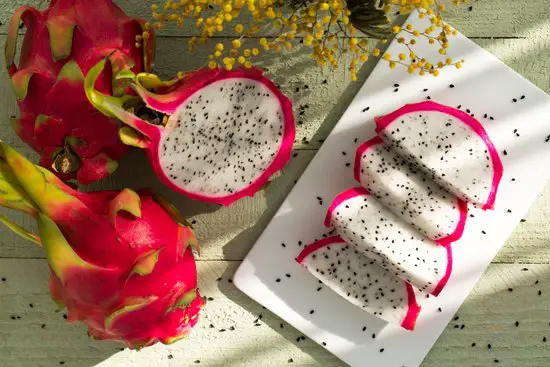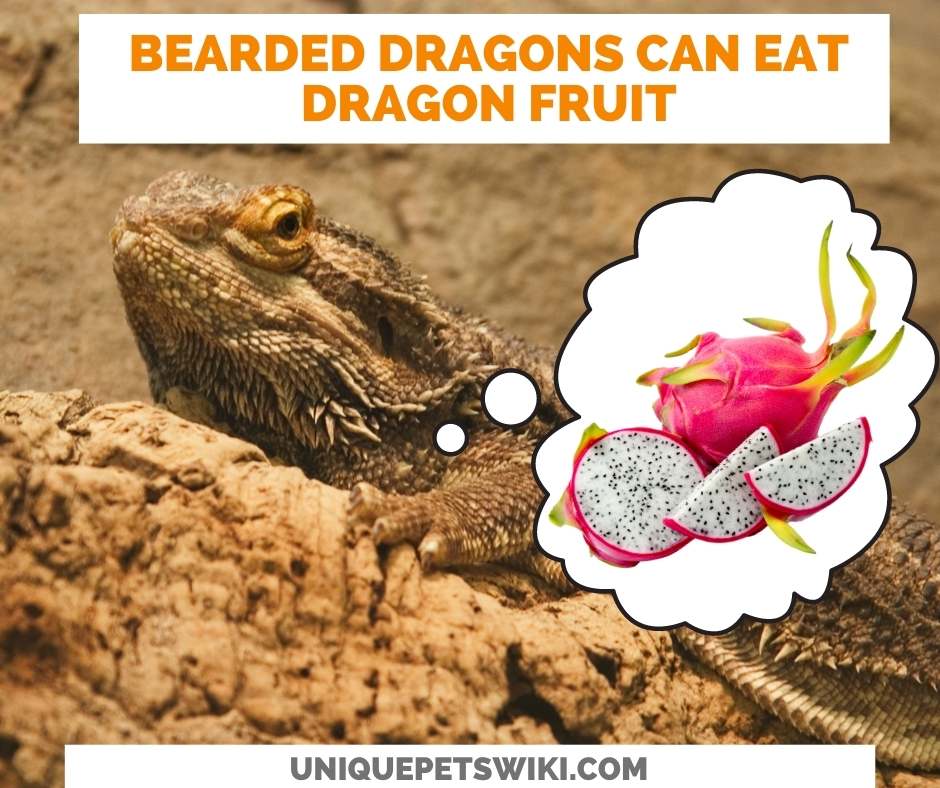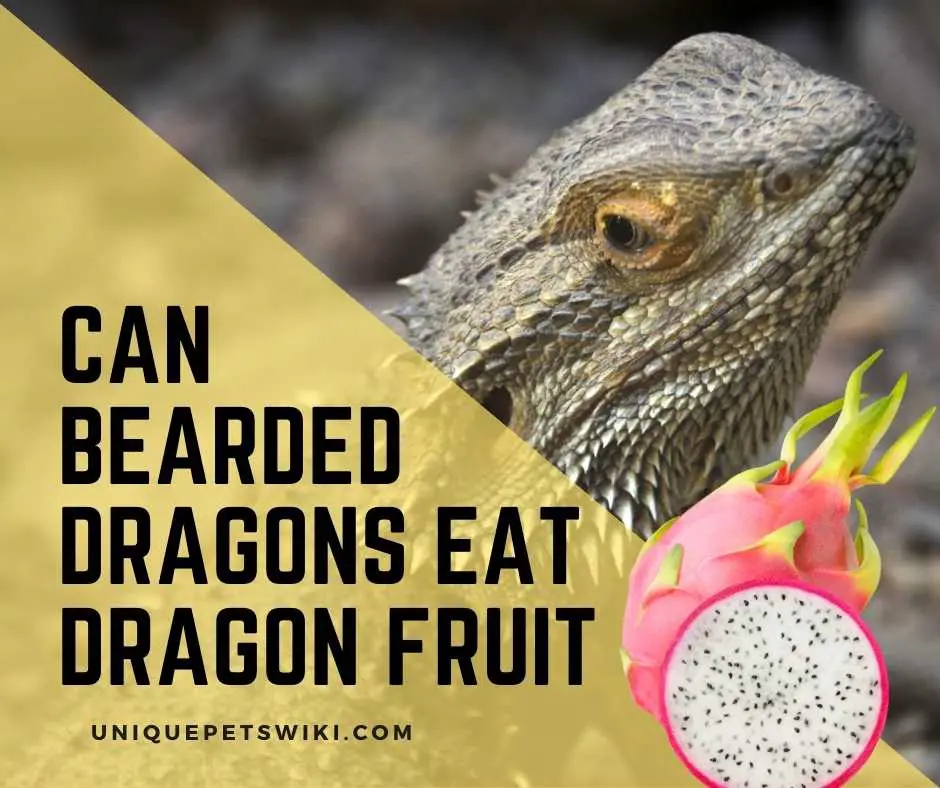Dragon fruit is a rich source of vitamins, such as vitamin C and minerals. Are you wondering if bearded dragons can eat dragon fruit? Here is the place to find all the answers.
Dragon fruit is a famous fruit that many people enjoy eating since it is refreshing and tasty. However, only a few sources talk about dragon fruit’s goodness to bearded dragons or if you should avoid it.
After researching dragon fruit and finding out what veterinarians say about it, I thought I should share the knowledge with you. Read on for more good information.
This article has been reviewed by Dr. Dilber. Read more about our knowledge control process here.
Contents
Dragon fruit nutritional profile

There is much to know about dragon fruit before you even decide it’s time for your lizard to munch on it. Above everything else, make sure you understand the nutrients that this fruit carries and see if they make a worthwhile contribution to bearded dragons’ health.
The table below contains data showing the various nutrients in dragon fruit and their content per 100g.
| Nutrients | Amount | Unit |
| Water | 85 | g |
| Protein | 1.1 | g |
| Carbohydrates | 11 | g |
| Fiber | 1.8 | g |
| Fat | 0 | g |
| Calcium | 10 | mg |
| Phosphorus | 36 | mg |
| Vitamin C | 6.4 | mg |
| Sodium | 39 | mg |
| Ca:P ratio | 1:4 | – |
The table reveals that the phosphorus content in dragon fruit is exceedingly high compared to the calcium. As far as the beardies go, one part of phosphorus in the diet needs to be accompanied by another part of calcium or two, a 1:1 or 2:1 ratio.
Can Bearded Dragons Eat Dragon Fruit?

Typically, bearded dragons eat a variety of fruits but only as a treat. There is no harm feeding a small dragon fruit to your lizard occasionally now and then. This means that bearded dragons can eat limited amounts of dragon fruit.
Vet answer: Dragon fruit is high in vitamin C which plays an important role In boosting the immune system of beardies. Besides that, the antioxidants present in the fruit also maintain the overall health of the bearded dragon and prevent frequent aging.
Moreover, dragon fruit is relatively high in fiber that helps in food digestion and helps the dragons with bowel movement. This fruit has no fat, therefore, you don’t need to worry about your pet becoming overweight.
Calcium-phosphorus in the dragon fruit is equal, so, if your bearded dragon eats much fruit, phosphorus can prevent the absorption of calcium. this will weaken the bones of bearded dragons. Dragon fruit is something that you need to control its consumption.
How Often Can Bearded Dragons Eat Dragon Fruit?
Ideally, bearded dragons can eat Dragon fruit once a month or less frequently. The primary reason it is necessary to limit the intake of dragon fruit is because of its disproportional Ca to P ratio.
A lot of phosphorus in the diet tends to hinder the effectiveness of calcium absorption into the body. When the body gets inadequate calcium from the food, it draws out most of this mineral from the bones.
Calcium is paramount in making the bones remain strong, so bearded dragons become vulnerable to metabolic bone disease, which is a pretty fatal condition upon Ca extraction.
Also, dragon fruit tends to be acidic, and therefore, it can be harmful to bearded dragons in too high doses. This fruit is not a great source of calcium, and this calls for the need to look for other alternative fruits that are highly nutritious.
Can Bearded Dragons Eat Dragon Fruit Seeds?
Dragon fruit seeds are famous for their high fiber and fatty acids, including omega 3 fatty acids. Dragon fruit seeds have the same texture as the seeds from kiwi, and they are both edible to bearded dragons.
However, beardies are vulnerable to impaction when they eat fruit seeds. Dragon fruit has small seeds, and bearded dragons will be fine digesting them.
Wild beardies are independent and survive by searching for food. Among the foods they eat are cactus, which serves as their staple food. Cactus has slightly bigger seeds, and the beardies have no problem eating them.
This means that you can feed the dragon’s fruit as long as you keep the fruit in moderation.
What Fruits Can Bearded Dragons Eat Instead of Dragon Fruit?
Bearded dragons are required to eat fruits occasionally, and they only make up 10% of the diet. The beardies will enjoy eating various fruits, including pawpaw, watermelon, blueberries, strawberries, pineapple, cherries, plums, pears, peaches, etc.
Fruits are excellent sources of vitamins, minerals, and other essential nutrients that bearded dragons may not get from other foods. Some fruits require you to peel them and remove the seeds, while others require only chopping.
Always make sure to clean the fruits properly before feeding and remove the remaining ones after feeding, as most of them are prone to rotting.
Excess fruits are harmful to bearded dragons as they contain a lot of water, and some have more phosphorus than calcium and contain oxalates. If you offer too many fruits, they can result in diarrhea or expose the lizard to health problems, like MBD.
How to Prepare Dragon Fruit for Bearded Dragons?
preparing and serving dragon fruit to your pet is a straightforward task. Here are simple steps to follow.
- Buy fresh dragon fruit, and if available, select the organic ones.
- Clean the fruit to wash off any dirt, pesticides, or fungicides.
- Remove the skin, or cut the fruit and scope the flesh part.
- Then, the fruit is ready for serving. Mix it with other fruits to have a variety, and include greens and veggies as well. That makes a perfect salad to offer to your lizard friend.
Wrapping Up
Now you have a clear understanding of what benefit dragon fruit can have on bearded dragons and why you should limit its intake. The beardies should eat this fruit as a treat on rare occasions, about once a month.
Dragon fruit is nutritious, but it tends to be acidic and can lead to health issues to the beardies, thus feed it sparingly. It also has a disproportionate ratio of calcium and phosphorus, which can be problematic for the beardie’s health.
